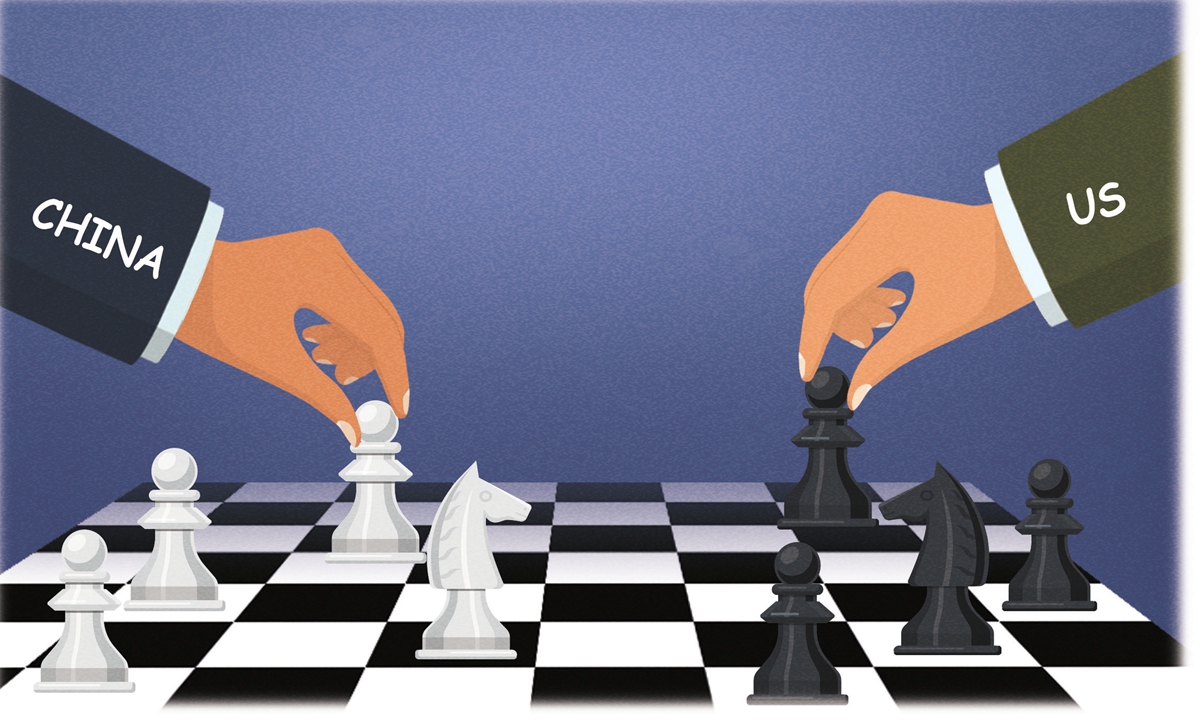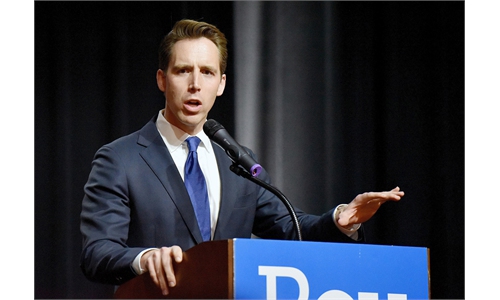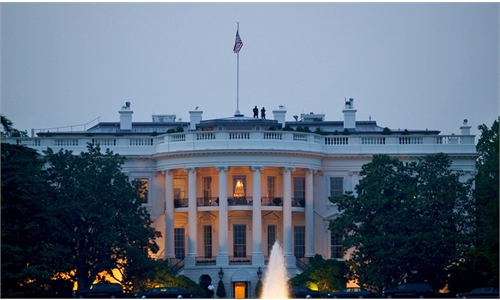
Illustration: Liu Rui/GT
Editor's Note:The world is changing with the downward spiral of China-US relations. Wild questions are being thrown around. Should China be blamed for the COVID-19 pandemic? Is there an increasing trend of innovation within Chinese companies? How might this affect other major technological powers? To what degree will certain Western media outlets continue to spread anti-China bias? Global Times (GT) reporter Li Qingqing talked to Shaun Rein (Rein), founder and managing director of the China Market Research Group, about these issues.
GT: China and the US have had very different results in their COVID-19 fights. Have you expected this? The US and other countries have tried to blame the pandemic on China. What is your opinion about this accusation?
Rein: It's absurd to blame China for COVID-19. The virus is most likely a natural freak of nature. To criticize the Chinese government for this is wrong. If you take a look at why it spread globally, it's because of the failed policies stemming from Europe, the US and Australia. For example, the Trump administration tried to scapegoat China for everything. They blocked all Chinese people from the mainland from visiting the US. But they didn't block Europeans or Americans who had traveled to the Chinese mainland. We have all seen pictures of JFK airport in New York, where thousands and thousands of tourists were coming into the US. They were packed together during the height of COVID-19. If only one person had COVID, then everybody would get sick. That's exactly what happened.
You could also see Australian Prime Minister Scott Morrison, who banned immediately Chinese mainland people from visiting Australia. But for months, he didn't ban Italians from visiting Australia even when Italy was plagued with the virus. Other countries were Sinophobic when it came to containment of COVID-19. They blocked people from the Chinese mainland, but they didn't block others. And as we all know, virus doesn't care about your race or your rationality. It just goes after humans. That's their first mistake.
Second, you can see that China has taken everything a lot more seriously. In my housing compound in Shanghai, we had mainlanders who came back from the US, and they were locked at home for 14 days. The local government put tape on their doors and let everybody know this family was under quarantine. The government would come by every day, take their temperatures, and make sure everything was okay. These people were taken care of by the government. But in the US, Vice President Mike Pence's staff got COVID-19, but Pence is still running around. China took a serious, systematic approach to contain it. For any sane and objective person, it's quite obvious why China contained it and the US hasn't.
The Chinese people need to be given credit too. They were willing to sacrifice, and they stayed at home. Unlike in the US and Europe, quarantine means you can go to work. Chinese people also wear masks, doing a good thing for society and themselves. And the Chinese leaders were listening to scientists and medical professionals like Zhong Nanshan. They took a science-based approach to contain COVID-19. If you look at Trump, he criticizes Dr Anthony Fauci and scapegoats him.
GT: You have written three books: The End of Copycat China: The Rise of Creativity, Innovation, and Individualism in Asia, The End of Cheap China: Economic and Cultural Trends that Will Disrupt the World, and The War for China's Wallet: Profiting from the New World Order. Does the end of "copycat China" and "cheap China" mean that innovation has become major trend happening within Chinese companies? How might this affect other major technological powers, especially the US?
Rein: In 2014, I published The End of Copycat China, where I predicted that China was going to become an innovation powerhouse. At that time, Silicon Valley criticized me heavily. They said I was crazy. They said that the Chinese were not creative, were culturally unable to innovate, and that the Chinese government stifled innovation.
But six years after I published the book, it's quite clear that China is an innovation powerhouse. When it comes to mobile services, it's three-plus-years ahead of the US, and maybe five years ahead of Western Europe. Because of China's lead in mobile services innovation, we were able to better contain COVID-19. For example, in China, almost everybody uses WeChat Pay or Alipay. It's a cashless, contactless society. In the US, people are still using cash and credit cards, which may also spread COVID-19. The US still has a lead in semiconductors, with platforms like Android and IOS.
But that's not because China can't do it. It's because there are so many low-hanging fruits. Why would China invest in semiconductors when it could just buy American semiconductors and focus on making money with mobile services innovations? China clearly was looking for a win-win trade policy with the US. Chinese companies were not stealing IP. They are willing to pay for American technology. It was easier and a win-win situation for everyone.
But because of the Trump administration's trade war and containment policy, China has now begun to focus on innovation with semiconductors and operating systems. It's not easy. It will take five to 10 years. But we see China has set up a semiconductor fund of about $30 billion. We also see that Huawei is focused on its HarmonyOS. Chinese companies now have to focus on self-reliance. And it would be stupid for the US to think that Chinese cannot innovate with semiconductors or operating systems.
I think the Trump administration is shooting the US in the foot. American tech companies are now not able to sell to their biggest customers in China. My firm works with many American tech companies, and we develop their strategies. They are furious about Trump's policies because they are now losing their biggest market. And they are scared to openly criticize, because they worry that Trump will attack them on Twitter and get his hawkish American politicians to boycott their products.
GT: It seems that the Trump administration has pursued an economic decoupling policy with China. A few other countries have tried to follow the US suit, such as the UK and Australia. Can such a decoupling strategy, which comes at the cost of their economic interests, really last in the long run?
Rein: Unfortunately, I think decoupling is going to be around for about 10 to 20 years. I think the US under Trump has bullied and forced the Five Eyes Intelligence Alliance to take a very aggressive view toward China. I think it's sad. Other countries like India have gone along with the Trump regime because of historical tensions with China. Most countries don't want this. In the year before COVID-19, I traveled to about 40 countries and most businesspeople don't want to be stuck in the middle. They want to cooperate with China, but they are also worried because of the US bullying.
Look at Australia. Australia and China are natural trade partners. Before COVID-19, China bought 38 percent of Australia's exports. There is no reason for China and Australia to have tensions. But some Australian politicians are fear-mongering and becoming more Sinophobic. They are listening as lapdogs of the Trump regime.

Shaun Rein Photo: Li Qingqing/GT
GT: The Trump administration has suppressed the development of high-end Chinese technological companies including Huawei and TikTok. As an entrepreneur, how do you evaluate these US moves? Can the US maintain technological superiority by suppression?Rein: The US is attempting to suppress because whoever controls technology is going to control the world. It's quite clear that Trump's attacks on Huawei and TikTok have nothing to do with national security. It has everything to do with power. Think about it: If Huawei were such a national security concern, why would the UK force its telecom equipment makers to get rid of Huawei by 2027? Does that mean Huawei and the Chinese government can spy on the UK for the next seven years? It's clear that it's an excuse.
Now, the US does have the technological lead and I think it will continue to maintain that in the next five to 10 years. But again, China has to catch up. It's do or die. To bet against China's ability to move up in innovation ranks would be a losing bet. I think there is going to be a technological decoupling in the world. Countries may have to make their choices. Do they work closely with the US or with China? It will be very difficult for the world to choose and to be able to work nicely with both sides, unfortunately, because of American aggression.
GT: You said in a video in June that Western media including the WSJ and Bloomberg would cut your quotes out of their articles because of your political leaning - you generally support the Chinese government. What is your opinion about such bias? Do Western media now have a more positive or negative effect on the Western public's understanding of China?
Rein: I was once quoted in the Bloomberg about once a week, but then one day, the editor sent a journalist-wide email in Asia, saying that we don't quote Shaun Rein, just because of my political leaning. It's absurd.
Many Western media outlets should be ashamed of themselves. They are incredibly biased, they lack objectivity and many of their journalists simply aren't qualified to be covering China. For example, The Economist and The Atlantic earlier said this year that democracies contain epidemics most effectively, and are better at fighting outbreaks. That's ridiculous. Vietnam and China have done good jobs, as well have other countries around the world. But India, Brazil and the US, the biggest democracies in the world, are overrun with millions of cases. Too many journalists are ideologically driven rather than objective and unbiased.
A high-ranking staff member of The Economist lived in China for 10 years. But he does not speak Chinese. He then moved back to New York, and for the last 10 years or so, he's been The Economist's editor on China affairs. For 20 years, he has been covering China-related topics, but he doesn't speak Chinese. How can this person be so arrogant to think that he can explain China to the rest of the world without even knowing the language?
Many other Western journalists sensationalize things. A journalist from the Washington Post once posted on Twitter that there is a soft rationing going on in China. That has run across many media, saying that Chinese people have to do "n-1" ordering food which means that five people are only allowed to eat four dishes. It's absurd. Now many Americans think that China is rationing and China is going through a famine. A lot of Western media outlets should be absolutely ashamed of themselves for their bias. They portray China in a negative way. Should media outlets criticize the Chinese government? Sometimes. It's important for the media to cover the good and the bad. But there needs to be qualified journalists.
GT: Do you think the Chinese public has an objective understanding of the US and other Western countries? How might one better promote Chinese and Western communication channels, and reduce misunderstandings?
Rein: It's clear that Chinese understand the US better than Americans understand China. More than 3 million Chinese people have studied in the US over the last 40 years. Chinese elites and many Chinese middle-class have gone to the US to learn the culture too. But the US? You'd be shocked by how many American professors in Chinese studies don't even speak Chinese. You'd be shocked that many analysts of China don't speak Chinese and have never lived in China. The lack of understanding in the US about China is clearly a problem. It is clearly increasing tensions.




